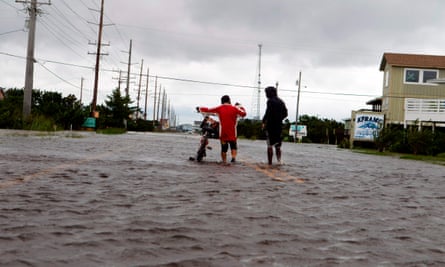As the US continues to be pummeled by the coronavirus pandemic, a fresh looming threat is set to complicate efforts to contain the outbreak – an unusually fierce hurricane season.
The official season for Atlantic hurricanes doesn’t start until 1 June, but for the sixth year in a row there’s been a named storm occur before this date, with tropical storm Arthur brushing the Outer Banks of North Carolina on Monday.
Arthur is set to be just the opening salvo in an active period of hurricanes, according to forecasters, with Penn State’s Earth System Science Center estimating there will be between 13 and 24 named storms – a category reached when the National Hurricane Center deems a storm to have wind speeds of at least 39mph.
Penn State researchers’ best guess is there will be 20 named storms, eight more than the 30-year average, which would make 2020 one of the most active years for hurricanes on record. The National Oceanic and Atmospheric Administration (Noaa) will release its own projection on Thursday.
While it’s uncertain how many of these storms will hit the US, researchers at Colorado State University have calculated that there is a nearly 70% chance this year that at least one major hurricane – a category three event or greater with winds exceeding 111mph – will make landfall on American soil.
“As far as we can tell it’s going to be an extremely active hurricane season,” said Jhordanne Jones, a researcher at Colorado State University’s department of atmospheric science. Jones said a La Niña climate event is expected to cool waters in the Pacific, causing a sort of seesawing effect where waters in the Atlantic will warm up and strong winds will form – ideal conditions for a hurricane.
The prospect of a disastrous hurricane making landfall is causing growing angst in coastal US states, such as Florida and Louisiana, that are already in the process of restarting economic activity during the coronavirus pandemic.
The normal strategy of cramming displaced people into temporary shelters to escape flooding risks spurring a fresh wave of infections, forcing authorities to tear up their standard hurricane plans.
“In our first meeting about this, we were like, ‘Oh my God, we will have to have shelters with Covid,’” said Steven Davis, president of All Hands Consulting, a disaster preparation firm. “This year is different because you can’t put a bunch of people in an elementary school with a disease spreading. It’s going to be challenging. We are having to redo all of our plans.”
Emergency planners are trying to engineer social distancing by recruiting a greater number of shelters, allowing displaced people to spread out and observe mask wearing and regular hand-washing. Hotel rooms may be commandeered before a storm hits to house people. Bus services to escape routes may be replaced by contracts with individual ride hailing services such as Uber and Lyft.
The pandemic has thrown up a range of potential problems in a disaster situation. Volunteers who usually help with relief efforts may be sick or unwilling to be in close contact with people potentially infected, while it may be difficult to transfer medical expertise and supplies between states. The economic downturn triggered by the pandemic means many people may not even have the means to flee a storm before it hits.

The Federal Emergency Management Agency (Fema), previously heavily criticized over its faltering response to 2017’s Hurricane Maria, which devastated much of Puerto Rico, has been attempting to map out a very different sort of scenario for 2020. The agency has been working with various partners on drawing up guidelines that include advising people to bring hand sanitizer, cleaning materials and two cloth face coverings per person if they are forced into a shelter.
“We are now well past the question of what to do, we have to deal with it because we do not have a vaccine for this hurricane season and probably not for the next one either,” said Craig Fugate, the administrator of Fema during Barack Obama’s presidency. “People are the vector, so we run the risk of increasing the spread the more we move them.”
Fugate said that it will be important for people to not move unless they are within an evacuation zone, and even then only travel short distances to family. A shelter run by the Red Cross or other organization should be the last resort, he said.
Even in the midst of the coronavirus pandemic, scientists have been at pains to point out that the impact of the climate crisis will be longer and deeper. A recent study found that global heating has increased the likelihood of a hurricane developing into a major storm with winds greater than 110mph since 1979, by around 8% a decade. This trend is only set to intensify.
“The priority to get people out of storm surge zones and coastal wind zones and then worry about Covid,” said Davis. “If you get Covid there’s a good chance you won’t die. If you get 20ft of water in your house, you’ll probably die.”








